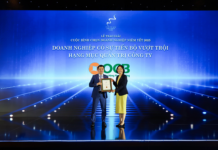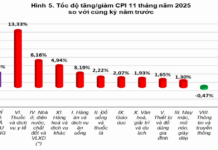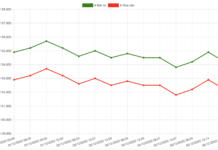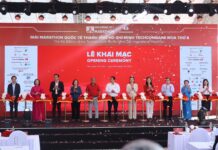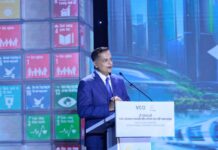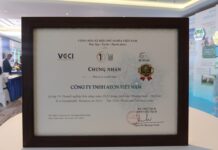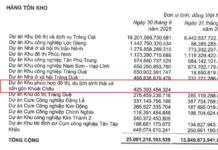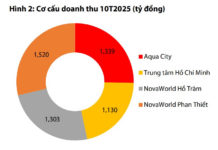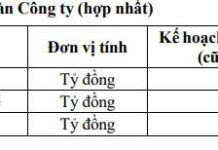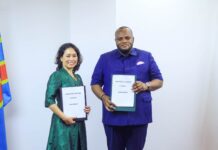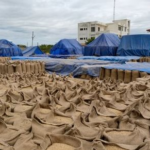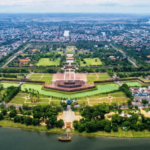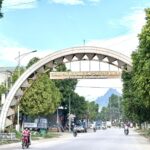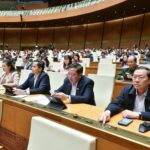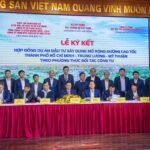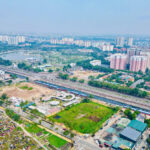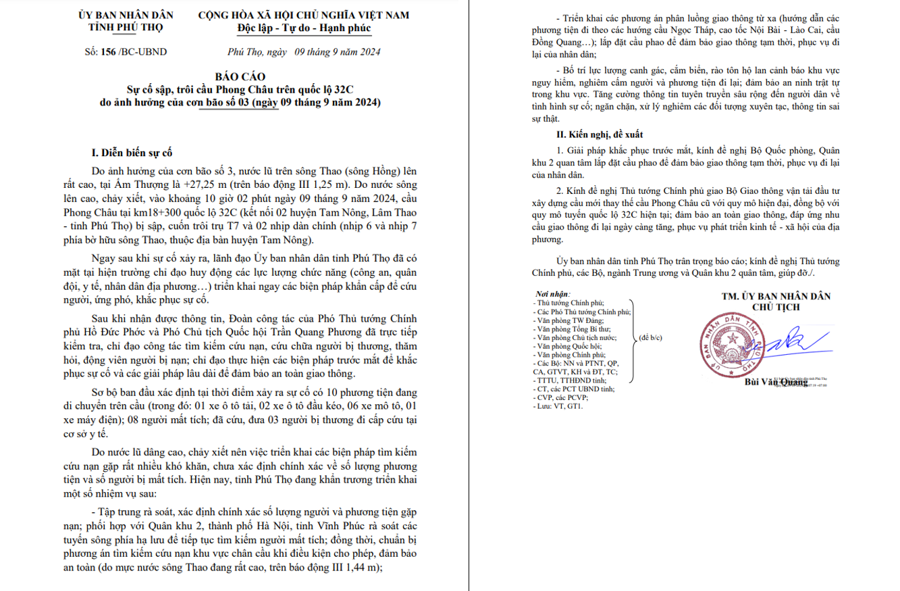The closing ceremony of the session on the afternoon of November 30 was attended by General Secretary To Lam, President Luong Cuong, Prime Minister Pham Minh Chinh, and other current and former leaders of the Party and State.
In his closing remarks, Chairman of the National Assembly Tran Thanh Man emphasized that the National Assembly had considered and decided on a large volume of work, including many complex issues related to various sectors and fields, and urgent practical requirements.
A SPIRIT OF INNOVATION IN LAWMAKING
According to the National Assembly Chairman, this session involved an extensive legislative agenda. Based on careful and thorough consideration, with a spirit of innovation in lawmaking, coordination between the Standing Committee of the National Assembly and the Government, and collaboration between drafting and reviewing agencies during the law-drafting process, the National Assembly passed 18 laws with high approval rates.
These laws include the Law on Trade Unions (amended); Law Amending and Supplementing a Number of Articles of the Law on Pharmaceuticals; Law Amending and Supplementing a Number of Articles of the Law on Health Insurance; Law on Fire Prevention, Fighting and Rescue; Law on Urban and Rural Planning; Law on Value Added Tax (amended); Law amending 4 laws in the field of investment; and Law amending 9 laws in the field of finance and budget…

The National Assembly also passed 21 resolutions, including four legislative resolutions: Resolution on piloting the handling of evidence and assets during the investigation, prosecution, and trial of certain criminal cases; Resolution on the organization of urban administration in Hai Phong city; Resolution on mechanisms and policies to address difficulties and obstacles related to projects and land in inspection, audit, and court conclusions in Ho Chi Minh City, Da Nang City, and Khanh Hoa Province; and Resolution on piloting the implementation of commercial housing projects through agreements on the receipt of land use rights or existing land use rights.
Additionally, the National Assembly provided initial feedback on ten other draft laws.
During this session, the National Assembly discussed the Government’s reports on the implementation of the 2024 socio-economic development plan and state budget. They also considered and decided on the 2025 socio-economic development plan, state budget estimate, and central budget allocation, along with numerous proposals and projects on urgent matters serving national interests and people’s livelihoods, maximizing resources and development opportunities. These include the Resolution on the establishment of Hue City under the central government; Decision on investment policies for the National Target Program on Cultural Development for the period 2025-2035; National Target Program on Drug Prevention and Control until 2030; high-speed rail project on the North-South axis; and the decision to restart investment in the Ninh Thuan Nuclear Power Project…
The National Assembly also reviewed and passed a resolution on the supervision of the implementation of policies and laws on real estate market management and social housing development from 2015 to 2023. They discussed the synthesis of opinions and recommendations from voters and people, the results of supervising the handling of voters’ recommendations, and other important reports.
In this session, the National Assembly conducted questioning and answering sessions in three areas: Banking, Healthcare, and Information and Communications. The National Assembly provided feedback to issue a resolution on questioning and answering.
Regarding personnel work, the National Assembly Chairman stated that it was carried out strictly following the regulations of the Party and the laws of the State. The National Assembly elected the President of the Socialist Republic of Vietnam; elected a member of the Standing Committee of the National Assembly and the Secretary-General of the National Assembly; approved the appointment of the Minister of Finance and the Minister of Transport; and approved the appointment of judges of the People’s Supreme Court. Other personnel work was also carried out within the National Assembly’s competence, achieving high consensus among the deputies.
BUILDING A LEGAL FRAMEWORK FOR EMERGING ISSUES
“The National Assembly acknowledges and highly appreciates the Government’s unwavering determination, continuous efforts, and effective innovations in direction and administration,” said the National Assembly Chairman. “Despite the numerous challenges and unexpected difficulties, such as natural disasters and floods, the socio-economic development tasks for 2024 have been basically accomplished.”
The National Assembly also analyzed and frankly pointed out the existing difficulties, challenges, and shortcomings in the economy, offering specific solutions. They requested that the Government study and promptly implement the suggestions of the deputies, fulfilling their commitments to the National Assembly, voters, and people nationwide.

Moving forward, the National Assembly suggested that the Government closely follow the practical situation, enhance its capacity for analysis, forecasting, and timely policy responses, and strive to achieve the highest possible results in the 2025 socio-economic development plan and the targets and goals set by the 13th National Party Congress.
To further strengthen lawmaking, closely linking legislation with law enforcement, and considering this as an important factor in preventing corruption, wastefulness, and negativity, the National Assembly requested that the Government, agencies of the National Assembly, the People’s Supreme Court, the People’s Supreme Procuracy, the State Audit Office, and relevant agencies focus on directing and urgently issuing detailed documents to implement effectively the laws and resolutions just passed by the National Assembly.
At the same time, they should regularly review and evaluate the effectiveness and quality of policies after their issuance, making timely adjustments, supplements, and amendments. They should also proactively and actively build a legal framework for emerging issues and new trends, creating breakthroughs for the country’s development.
The National Assembly Chairman emphasized that 2025 is a crucial year for successfully fulfilling the tasks of the 2021-2026 term.
In the spirit of the Resolution of the 10th Plenum of the 13th Party Central Committee, which includes the urgent requirement for the organization and streamlining of the apparatus of the political system to meet the requirements and tasks of the country in the new period, and in line with General Secretary To Lam’s important speech at the opening of this session and his recent directions on corruption prevention, wastefulness, and negativity, the National Assembly, the Standing Committee of the National Assembly, the Council of Ethnic Groups, the Committees of the National Assembly, the Office of the National Assembly, and the agencies under the Standing Committee of the 15th National Assembly will continue to strongly innovate and urgently reorganize their apparatus to become “lean, strong, and effective.”
At the same time, they will enhance their capacity and efficiency, linking this with restructuring the team of officials with sufficient virtues and abilities to match their tasks. They will accompany the Government and organizations in the political system, striving to achieve the highest possible results in the 2025 socio-economic development plan and contributing to the successful implementation of the Resolution of the 13th National Party Congress. They will also prepare for the Party congresses at all levels, leading up to the 14th National Party Congress, creating the best conditions for the innovation and strong development of the nation in the new era.
The Golden Opportunity: Unveiling Thanh Hoa’s Billion-Dollar Real Estate Venture
After 2 years of bustling construction, the綜合服務中心 Project in Dong Huong Ward, Thanh Hoa City, suddenly came to a halt and has remained stagnant for years.
Peace Province: Strengthening Diplomatic Ties and Economic Cooperation to Attract Investment
Peace Province boasts a diverse range of industries, including agriculture, industry, and tourism, each presenting untapped potential for development. In recent years, the province has actively fostered diplomatic relations and economic collaborations, introducing numerous investment incentives to attract businesses and investors alike.
Surety Bonds: Unlocking Seized Assets with Financial Assurance
The resolution passed by the National Assembly stipulates that the deposit amount must not be lower than the value of the exhibits and assets as determined by the asset valuation.






